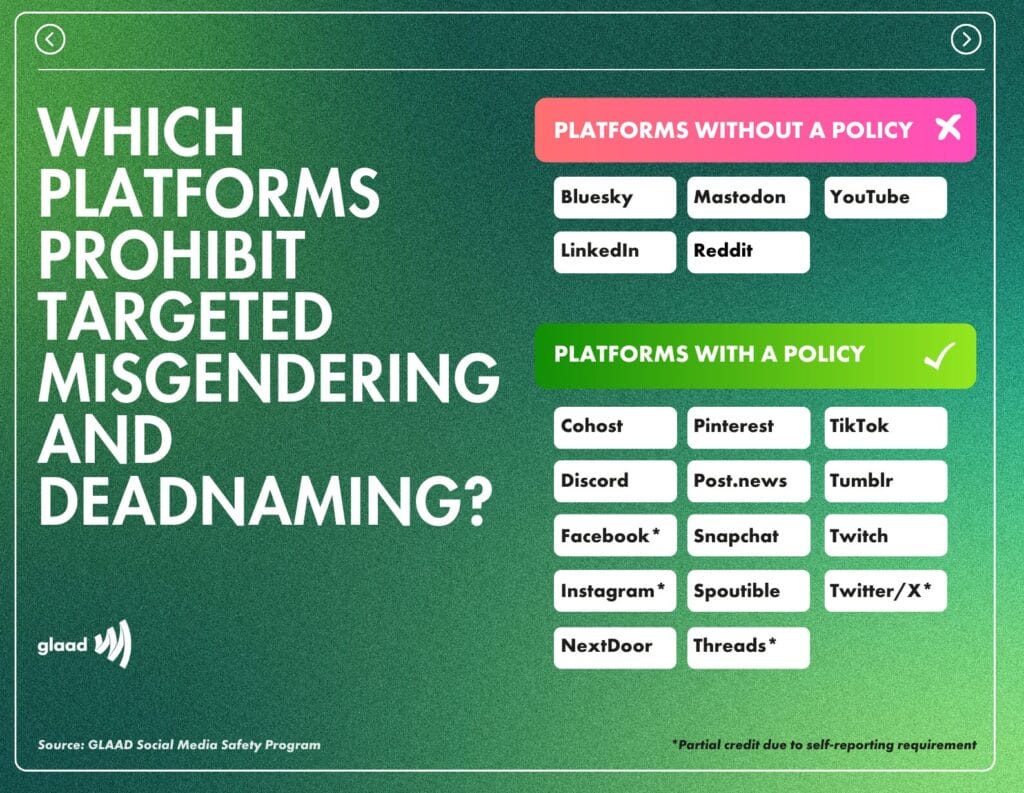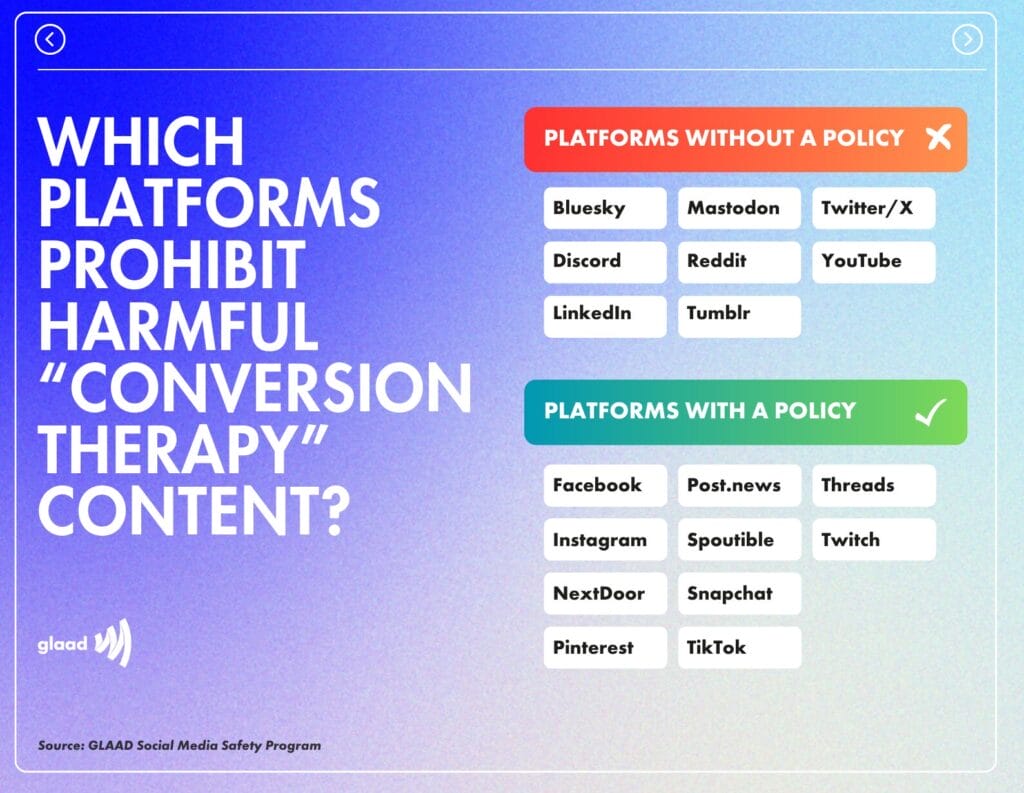Contact: press@glaad.org
Join GLAAD and take action for acceptance.
Trending
- OP-ED: My Filipina Mother Taught Me to Blend In. My HIV Diagnosis Taught Me to Be Seen
- Loud and Proud in The Lone Star State: Dallas Church, Cities Across Texas Respond to Crosswalk Controversy with Pride
- WATCH: Scott and Mark Hoying on Creating “Fa La La Family”, a Holiday Story That Celebrates Every Kind of Love
- NewFest 37 Celebrates Spirit Day with Shorts Program, “The Celluloid Closet” & More
- We All Could Use Some Queer Joy! Be a Part of The Skin Deep + GLAAD’s New Collab
- Honoring Paul Kawata: A Legacy of Courage, Community, and Change
- Communities of Color Lead with Love on Spirit Day 2025
- Five Queer Filipinos Who Were On Project Runway
NEW GLAAD REPORTS SHOW YOUTUBE, X/TWITTER, AND META’S INSTAGRAM, FACEBOOK, AND THREADS LAG BEHIND ON KEY LGBTQ SAFETY PROTECTIONS
Snapchat Joins TikTok, Twitch, Pinterest and Others in Adding Policies Against Targeted Misgendering and Deadnaming and Promotion of Harmful “Conversion Therapy” Content
“It’s imperative to have specific policy addressing this issue.” — IFTAS
(Thursday, February 29, 2024) – GLAAD, the world’s largest lesbian, gay, bisexual, transgender, and queer (LGBTQ) media advocacy organization today released new reports documenting the current state of two important LGBTQ safety policy protections on social media platforms.
The reports show how numerous platforms and apps (including, most recently Snapchat) are increasingly adopting two LGBTQ safety protections that GLAAD’s Social Media Safety Program advocates as best practices for the industry: firstly, expressly stated policies prohibiting targeted misgendering and deadnaming of transgender and nonbinary people (i.e. intentionally using the wrong pronouns or using a former name to express contempt); and secondly, expressly stated policies prohibiting the promotion and advertising of harmful so-called “conversion therapy” (a widely condemned practice attempting to change an LGBTQ person’s sexual orientation or gender identity which has been banned or restricted in dozens of countries and US states).
Major companies that have such LGBTQ policy safeguards include: TikTok, Twitch, Pinterest, NextDoor, and now Snapchat.
Companies lagging behind and failing to provide such protections include: YouTube, BlueSky, LinkedIn, Reddit, and Mastodon. X/Twitter and Meta’s Instagram, Facebook, and Threads have received partial credit due to “self-reporting” requirements.
“Now is the time for all social media platforms and tech companies to step up and prioritize LGBTQ safety,” said GLAAD President and CEO Sarah Kate Ellis. “We urge all social media platforms to adopt, and enforce, these policies and to protect LGBTQ people — and everyone.”
Companies will have another opportunity to be acknowledged for updating their policies later this year. To be released this summer, GLAAD’s annual Social Media Safety Index report will feature an updated version of the charts.
Read the two reports — featuring GLAAD’s guidance for platforms, as well as additional details on each platform’s policies:


Expressing concurrence with GLAAD’s Social Media Safety Program guidance, IFTAS (the non-profit supporting the Fediverse moderator community) stated in a February 2024 announcement: “Due to the widespread and insidious nature of expressing anti-transgender sentiments in bad faith, it’s imperative to have specific policy addressing this issue.” Further explaining the rationale behind such policies, the IFTAS announcement continues: “This approach is considered a best practice for two key reasons: it offers clear guidance to users, and it assists moderators in recognizing and understanding the intent behind such statements. It’s important to reiterate that the focus is not about accidentally getting someone’s pronouns wrong. Rather, our concern centers on deliberate and targeted acts of hate and harassment.”
Conveying appreciation to companies but also highlighting the need for policy enforcement, GLAAD’s new reporting notes that while the policies mark significant progress: “These new policy additions do not solve the extremely significant other related issue of policy enforcement (a realm in which many platforms are known to be doing a woefully inadequate job).”
About Targeted Misgendering and Deadnaming
Civil society groups, including GLAAD, Media Matters, and the Anti-Defamation League (ADL) have identified the practice of targeted misgendering and deadnaming as a form of hate speech. In recent years it has become one of the most common modalities of high-follower anti-LGBTQ accounts for expressing contempt and hate toward transgender and nonbinary people across major social media platforms. It is notably utilized to bully, mock, and harass prominent trans public figures (Geena Rocero, Admiral Rachel Levine, Dylan Mulvaney, 16-year-old Zaya Wade to name a few). Targeting well-known people serves to escalate visibility and engagement on posts, and express general hatred of all trans and nonbinary people and the LGBTQ community as a whole. A particularly egregious example of this practice is a July 2022 YouTube video in which far-right ideologue Jordan Peterson (known for his virulent anti-LGBTQ extremism) viciously misgenders and deadnames actor Elliot Page dozens of times in the course of a 15-minute rant. YouTube demonetized — but didn’t remove — the video, which has 3.5 million views, for violating its “advertising policies around hateful and derogatory content.”
About Harmful So-Called “Conversion Therapy” Content
In its January 2024 report, Conversion Therapy Online: The Ecosystem in 2023, the Global Project Against Hate & Extremism (GPAHE) observes that: “there is worldwide agreement among medical and psychological professionals that conversion therapy is dangerous and causes harm to LGBTQ+ individuals.” As noted above, there is broad consensus and building momentum toward protecting LGBTQ people, and especially LGBTQ youth, from this dangerous practice. However the promotion of such services continues to be widespread on social media platforms, via both organic content and advertising. While the GPAHE report cites that some platforms have made improvements in their mitigations of this content over the past year, they note that “GPAHE found deficiencies on all of the tech and social media platforms in its 2023 research.” There are many examples of simple solutions that platforms can and should urgently implement. For instance, GPAHE’s recommendations include: investing more in non-English language moderation, expanding the use of authoritative information boxes as a form of mitigation that accurately characterizes “conversion therapy,” and incorporating other common terms for such practices (such as: “unwanted same-sex attraction”) into moderation algorithms to identify violative content.
###
About the GLAAD Social Media Safety program:
GLAAD’s Social Media Safety program actively researches, monitors, and reports on a variety of issues facing LGBTQ social media users — with a focus on safety, privacy and expression — advocating for solutions in numerous realms. The annual Social Media Safety Index (SMSI) provides recommendations for the industry at large and reports on LGBTQ user safety across the five major social media platforms: Facebook, Instagram, X/Twitter, YouTube, and TikTok. Learn more by reading the 2023 GLAAD Social Media Safety Index & Platform Scorecard here.
About GLAAD:
GLAAD rewrites the script for LGBTQ acceptance. As a dynamic media force, GLAAD tackles tough issues to shape the narrative and provoke dialogue that leads to cultural change. GLAAD protects all that has been accomplished and creates a world where everyone can live the life they love. For more information, please visit www.glaad.org or connect @GLAAD on social media.
Add A Comment
Share this
Join GLAAD and take action for acceptance.
ALERT Desk Incident Reporting
Our Picks
Topics
Don't Miss
When I arrived at the Sofitel Los Angeles for the 2025 Black Queer Creative Summit…












